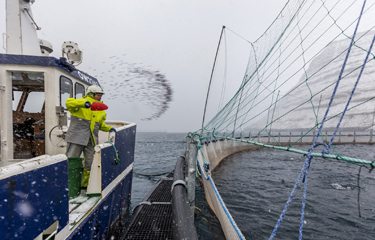Bakkafrost Group has reported an increased Q2 profit compared to the same period last year and a strong biological performance, but earnings before interest and taxes (EBIT) were held back by lower prices.
Bakkafrost reported a total EBIT of DKK 181.9 million (USD 28.9 million, EUR 24.4 million) for the second-quarter of this year, down from DKK 338.8 million (USD 53.8 million, EUR 45.5 million) in the corresponding period of 2019.
The Faroe Islands-based Atlantic salmon farming group’s operating revenues increased to more than DKK 1.1 billion (USD 174.8 million, EUR 147.8 million) for the last quarter, and to almost DKK 2.4 billion (USD 381.3 million, EUR 322.5 million) for the first-half of the year.
Its Q2 profit increased from last year’s DKK 188.6 million (USD 30 million, EUR 25.3 million) to DKK 471.7 million (USD 74.9 million, EUR 63.4 million), while its profit for the first half of 2020 was down to DKK 323.7 million (USD 51.4 million, EUR 43.5 million), a drop of DKK 78 million (USD 12.4 million, EUR 10.5 million) from last year.
The company harvested 20,878 metric tons (MT) gutted weight of fish in the last quarter, with the Faroes accounting for 12,948 MT and Scotland 7,937 MT. Its total harvested volume for the first-half of this year was 38,813 MT, with the Faroes and Scotland supplying 23,608 MT and 15,205 MT, respectively.
Stating that the overall biological performance of its Faroese and Scottish operations were strong during the last quarter, Bakkafrost’s expected harvest volume for 2020 in the Faroe Islands is 50,000 MT, while the expected harvest in Scotland is 39,000 MT. Harvest volumes for 2021 in the Faroes are expected to reach 62,500 MT, and 44,000 MT for Scotland.
CEO Regin Jacobsen acknowledged that the first-half of this year had been severely affected by the COVID-19 pandemic, and together with increased transportation costs and currency movements, this had a negative impact on the group’s financial results.
However, positive results were seen across all segments, with Jacobsen highlighting that its value-added processing (VAP) segment produced higher volumes than ever before in order to serve the increased demand from retail customers.
Half of the total Faroese harvested volumes in Q2 and H1 2020 went to the production of VAP products, which equated to 6,420 MT and 11,828 MT respectively. The segment made operational EBITs of DKK 48.6 million (USD 7.7 million, EUR 6.5 million) and DKK 37.8 million (USD 6 million, EUR 5.1 million) for the two periods.
It has also signed contracts covering around 33 percent of the expected harvest volumes for H2 2020. These contracts usually last for 12 months.
“The flexibility in our integrated value chain has proven its value and demonstrated our ability to adapt quickly to changes in market dynamics,” Jacobsen said. “We are also pleased by the benefits that are now beginning to materialize in the operation in Scotland as well as from our large investment program.”
The group’s Faroe Islands farming segment (FO) made an operational EBIT of DKK 85.8 million (USD 13.6 million, EUR 11.5 million) in the last quarter, down 72 percent on the same period of last year, with a slightly higher harvested volume but lower achieved prices. For H1 2020, FO’s operational EBIT was DKK 288.7 million (USD 45.9 million, EUR 38.8 million), some 46 percent less than a year previously.
Operational EBIT-per-kilogram for the FO farming segment was DKK 6.63 (USD 1.05, EUR 0.89) in the last quarter, compared with DKK 24.07 (USD 3.82, EUR 3.23) in Q2 2020.
The Scottish farming segment (SCT) – which represents the operating business of The Scottish Salmon Company PLC (SSC) that was consolidated in October last year – made an operational EBIT of DKK 28.8 million (USD 4.6 million, EUR 3.9 million) in Q2 2020, and DKK 58.5 million (USD 9.3 million, EUR 7.9 million) in H1 2020. Its operational EBIT-per-kilogram was DKK 3.63 (USD 0.58, EUR 0.49) for Q2 and DKK 3.85 (USD 0.61, EUR 0.52) for H1.
Meanwhile, its Fishmeal, Oil and Feed (FOF) segment delivered lower earnings before interest, taxes, depreciation and amortization (EBITDA) of DKK 49.9 million (USD 7.9 million, EUR 6.7 million) in the last quarter, with its sales of fishmeal climbing to 22,121 MT, of which the FO segment internally used 71 percent. Overall, it expects lower production volumes of fishmeal and fish oil in 2020, while Havsbrún’s sales of fish feed are expected to be 110,000 MT for the year, depending on external sales.
“Looking forward, we expect the COVID-19 pandemic to continue for some time, challenging the global market for salmon and making the outlook hard to predict,” Jacobsen said. “We believe, however, that the long-term outlook is still good as the fundamentals in the protein market have not changed.”
Photo courtesy of Bakkafrost Group







